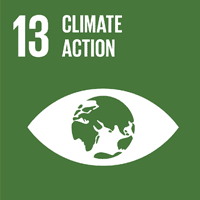13
PENANGANAN PERUBAHAN IKLIM
Mengambil Tindakan Cepat untuk Mengatasi Perubahan Iklim dan Dampaknya
Climate Action

Universitas Nahdlatul Ulama Surabaya (Unusa) stands at the forefront of sustainability in higher education, spearheading initiatives that support low-carbon energy use, environmental education, and climate action. Guided by the values of environmental stewardship and social responsibility, Unusa has integrated climate-focused policies and practices throughout the university, reflecting its dedication to mitigating climate change and promoting sustainable development.
Central to UII’s approach is a commitment to renewable energy and green infrastructure. Through the development of energy-efficient buildings and renewable energy projects, such as solar panel installations and the establishment of green zones on campus, Unusa is actively working to reduce its carbon footprint. These initiatives align with international sustainability frameworks, including the UN’s Sustainable Development Goals (SDGs), which call for urgent climate action and the adoption of low-carbon energy solutions.
UII’s educational programs play a crucial role in empowering students and the community to address environmental challenges. The university offers courses and degrees focused on sustainable development, particularly through its Department of Environmental Engineering and the Department of Architecture. These programs cultivate a deep understanding of environmental issues, preparing graduates to contribute meaningfully to the fight against climate change. Unusa also extends environmental literacy beyond campus borders through community outreach programs, where knowledge on sustainable practices is shared with local communities, policymakers, and other stakeholders.
Recognizing that meaningful climate action requires collective effort, Unusa has formed partnerships with government bodies, non-governmental organizations, and international institutions to drive impact. Collaborative research on renewable energy, sustainable urban planning, and ecosystem management exemplifies UII’s proactive approach to building sustainable solutions. These partnerships foster a holistic approach to climate action, encouraging multi-sectoral engagement and knowledge sharing.
Unusa initiatives in low-carbon energy, environmental education, and climate action reflect its core mission of fostering a sustainable future. Through these efforts, UII not only fulfills its responsibility as an educational institution but also exemplifies a model of environmental leadership, inspiring others to join in the global movement towards a greener, more resilient planet.
Unusa Initiatives in Low Carbon Energy, Environmental Education, and Climate Action
- Low Carbon Energy Measurement
- Climate Education Programs
- Climate Action Plan and Government Collaboration
- Climate Disaster Preparedness
- Partnership with NGOs on Climate Adaption
- Commitment to Carbon Neutrality
Unusa has developed a carbon footprint measurement methodology that tracks emissions from key sources, including electricity and campus transportation. Efforts to install solar panels at select faculties and initiate biodiesel production from used cooking oil underscore Unusa commitment to transitioning to low-carbon energy. This aligns with SDG 13 by directly addressing greenhouse gas emissions and promoting renewable energy.
Through the International Conference on Sustainable Built Environment (ICSBE) led by the Faculty of Civil Engineering and Planning, Unusa plays an active role in advancing global climate knowledge. This annual event fosters collaboration and develops climate solutions for built environments, emphasizing mitigation and adaptation strategies that align with SDG 13.
Unusa shares its climate initiatives, such as renewable energy projects, with Sleman Regency government, and engages in cooperative climate planning. This collaboration strengthens local climate action, aligning with SDG 13 by fostering resilience and adaptation strategies at a regional level.
Unusa Center for Climate Change and Disaster Studies (PuSPIK) serves as a focal point for climate and disaster resilience research, public awareness, and policy collaboration. Additionally, Professor Sarwidi’s innovative designs like the Emergency Protection Room (RULINDA) and Tsunami Safer Stage Building (BAPALATSU) highlight UII’s commitment to improving community resilience and working with government agencies and NGOs to address climate-related risks.
PuSPIK actively partners with various organizations and NGOs, building collaborative solutions for climate adaptation and educating communities on climate resilience strategies. This outreach exemplifies UII’s dedication to fostering sustainable development and resilience within broader society, in line with SDG 13.
Unusa achieved carbon neutrality in 2021, largely due to sustainable campus design, reduced operational activity during COVID-19, and energy-efficient new building projects. Incorporating natural lighting, solar installations, and paperless teaching practices have further reduced the university’s carbon footprint, advancing UII’s long-term goal for sustainable climate action.
